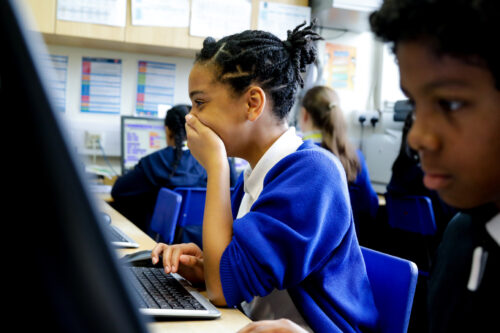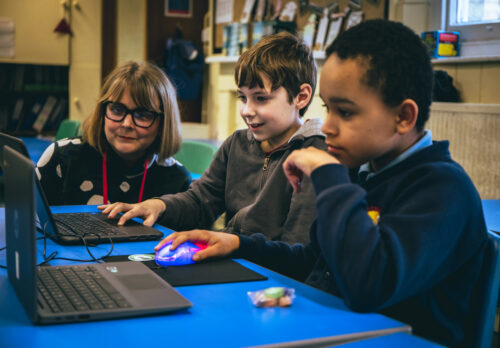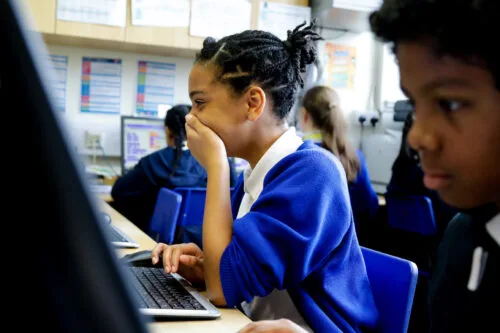Today’s blog is written by Dr Alex Hadwen-Bennett, who we worked with to find out primary school learners’ experiences of engaging with culturally relevant Computing lessons. Alex is a Lecturer in Computing Education at King’s College London, where he undertakes research focusing on inclusive computing education and the pedagogy of making.
Despite many efforts to make a career in Computing more accessible, many groups of people are still underrepresented in the field. For instance, a 2022 report revealed that only 22% of people currently working in the IT industry in the UK are women. Additionally, among learners who study Computing at schools in England, Black Caribbean students are currently one of the most underrepresented groups. One approach that has been suggested to address this underrepresentation at school is culturally relevant pedagogy.

For this reason, a particular focus of the Raspberry Pi Foundation’s academic research programme is to support Computing teachers in the use of culturally relevant pedagogy. This pedagogy involves developing learning experiences that deliberately aim to enable all learners to engage with and succeed in Computing, including by bringing their culture and interests into the classroom.
The Foundation’s work in this area started with the development of guidelines for culturally relevant and responsive teaching together with a group of teachers and external researchers. The Foundation’s researchers then explored how a group of Computing teachers employed the guidelines in their own teaching. In a follow-on study funded by Cognizant, the team worked with 13 primary school teachers in England to adapt Computing lessons to make them culturally relevant for their learners. In this process, the teachers adapted a unit on photo editing for Year 4 (ages 8–9), and a unit about vector graphics for Year 5 (ages 9–10). As part of the project, I worked with the Foundation team to analyse and report on data gathered from focus groups of primary learners who had engaged with the adapted units.
Conducting the focus groups
For the focus groups, the Foundation team asked teachers from three schools to each choose four learners to take part. All children in the three focus groups had taken part in all the lessons involving the culturally adapted resources. The children were both boys and girls, and came from diverse cultural backgrounds where possible.
The questions for the focus groups were prepared in advance and covered:
- Perceptions of Computing as a subject
- Reflections of their experiences of the engaging with culturally adapted resources
- Perceptions of who does Computing
Outcomes from the focus groups
“I feel happy that I see myself represented in some way.”
“It was nice to do something that actually represented you in many different ways, like your culture and your background.”
– Statements of learners who participated in the focus groups
When the learners were asked about what they did in their Computing lessons, most of them made references to working with and manipulating graphics; fewer made references to programming and algorithms. This emphasis on graphics is likely related to this being the most recent topic the learners engaged with. The learners were also asked about their reflections on the culturally adapted graphics unit that they had recently completed. Many of them felt that the unit gave them the freedom to incorporate things that related to their interests or culture. The learners’ responses also suggested that they felt represented in the work they completed during the unit. Most of them indicated that their interests were acknowledged, whereas fewer mentioned that they felt their cultural backgrounds were highlighted.
“Anyone can be good at computing if they have the passion to do it.”
– Statement by a learner who participated in a focus group
When considering who does computing, the learners made multiple references to people who keep trying or do not give up. Whereas only a couple of learners said that computer scientists need to be clever or intelligent to do computing. A couple of learners suggested that they believed that anyone can do computing. It is encouraging that the learners seemed to associate being good at computing with effort rather than with ability. However, it is unclear whether this is associated with the learners engaging with the culturally adapted resources.
Reflections and next steps
While this was a small-scale study, the focus groups findings do suggest that engaging with culturally adapted resources can make primary learners feel more represented in their Computing lessons. In particular, engaging with an adapted unit led learners to feel that their interests were recognised as well as, to a lesser extent, their cultural backgrounds. This suggests that primary-aged learners may identify their practical interests as the most important part of their background, and want to share this in class.

Finally, the responses of the learners suggest that they feel that perseverance is a more important quality than intelligence for success in computing and that anyone can do it. While it is not possible to say whether this is directly related to their engagement with a culturally adapted unit, it would be an interesting area for further research.
More information and resources
You can find out more about culturally relevant pedagogy and the Foundation’s research on it, for example by:
The Foundation would like to extend thanks to Cognizant for funding this research, and to the primary computing teachers and learners who participated in the project.
Website: LINK

